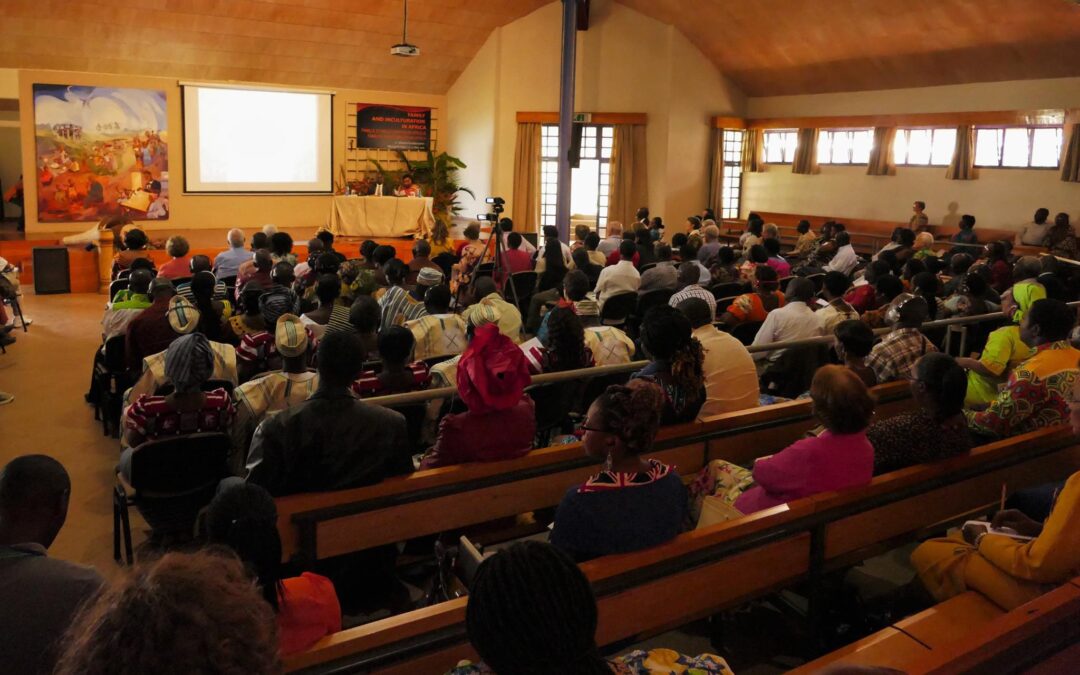
May 23, 2016 | Focolare Worldwide
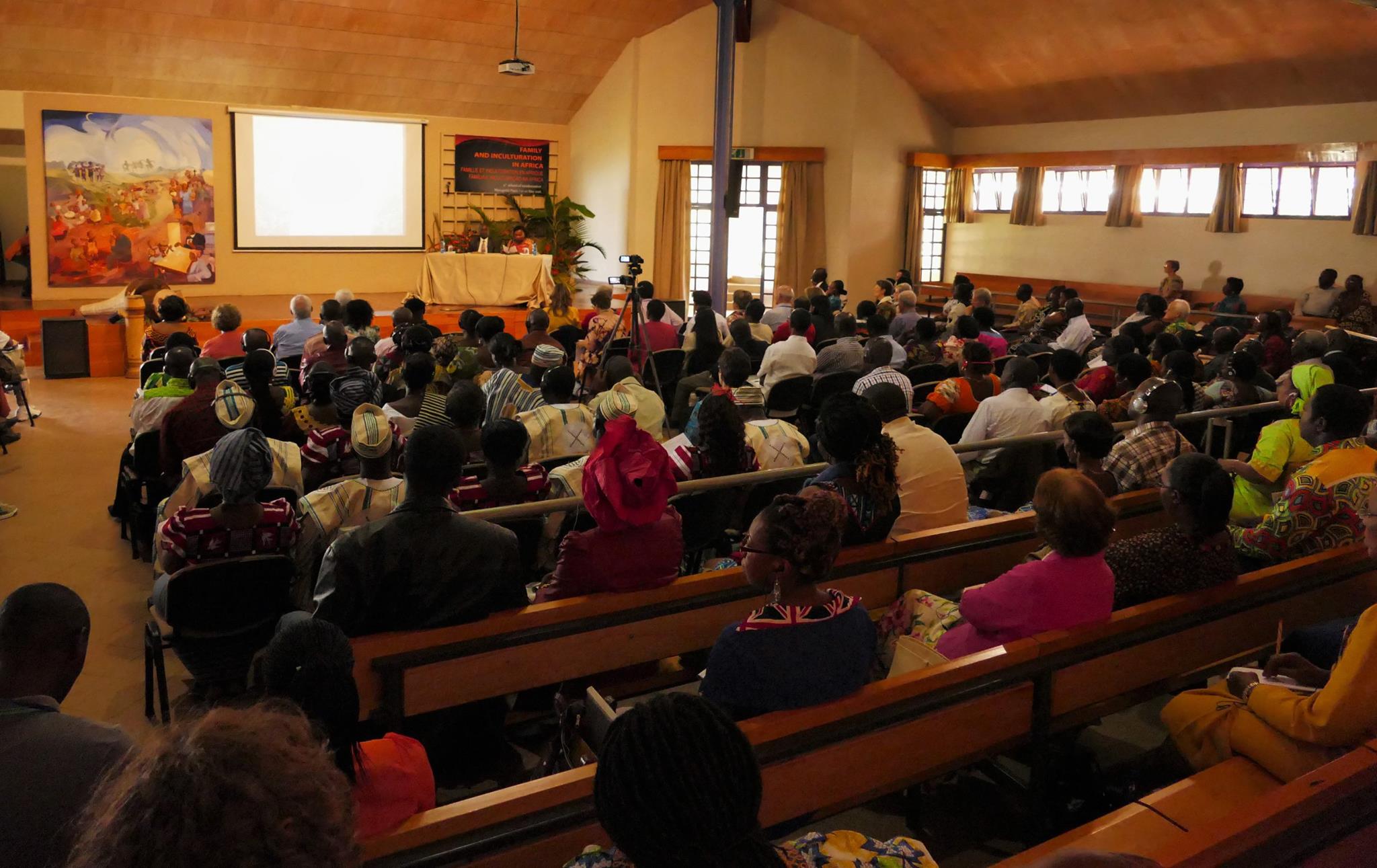 “In our culture,” recounts a Congolese husband after 14 years of marriage, “the first child should be immediately conceived. If after six months a woman still has not conceived, the husband’s family subjects her to stress.” “This is exactly what happened to me – his wife continued. We were already giving half of our salaries to my in-laws who were already in their old age and could no longer work, but this didn’t suffice. They wanted us to have a child who would carry on their lives even after they died. Since nothing happened, my mother-in-law wanted to convince me to go to the quack doctor, and seeing my reluctance, started putting pressure on my husband to ask for a divorce. But he was determined, and though full of respect, told them clearly that he did not give in to their demands because he loved me, and having been married in church, our marriage was “for always.” After three years we decided to adopt two boys, and after 12 years, thanks to a treatment I had in South Africa and our faith in God, we were able to have a daughter, and three months ago, a boy.” “Also my wife,” another Congolese husband continued, “had problems in conceiving. She managed to get pregnant but after a few months would lose the child. Our neighbours said all sorts of things, accusations kindled also by my aunt who did not like my wife. My family had even suggested we make a traditional sacrifice to our ancestors. We explained to them that as Christians, we are not against traditional rites since also in traditions do we find the seeds of the Word, but that we firmly believed in God’s help. One day, a friend of ours, a university professor came to visit, and hearing about our problem, gave us some precious suggestions on how to help the pregnancy progress. Precisely in those days, my wife was five months pregnant, and thanks to his suggestions, her pregnancy continued up to the birth of our child. The same thing happened for the other five children who followed later.” “Upon concluding my studies, “André says, “I found a job in another city, and before leaving, the family got together to give me all the advice they thought I needed. Among these, was that of marrying a girl of my own tribe. I didn’t agree. We had always thought I would marry the one God had planned for me, regardless of where she came from. When I fell in love with Julie, I did not know that she was from a tribe that fought my tribe. I learnt about it later, and it was then that I remembered the instructions of my family. After considerable thought, I understood better what it meant for me to live the Gospel, that is, to succeed in seeing every neighbour not as an enemy, but as a brother, since we are all children of the same Father. So I decided to stick to the principles God had sown in my heart. During our engagement, serious clashes sparked up between our two regions, but Julie and I, despite those difficult times, continued to nurture our relationship until we got married. Our neighbours were certain that our marriage would not last more than six months.” Julie confided: “Even I doubted it would last – but then I saw how faithful André was to me and even if we had different characters, nutritional habits, and mother tongue, we continued to love each other. This year, we celebrated our 23rd wedding anniversary with our four sons. “From the start, each of us had undertaken the commitment to make the other’s family our very own,” André continued, “and with time we managed to get closer to those relatives who initially countered our marriage. In our tradition, giving one’s own name to a child was a demonstration of affection one has for him, a way of immortalizing oneself in him. Julie wanted our sons to have the names of my relatives. With this gesture, also she has been immortalized in my family.”
“In our culture,” recounts a Congolese husband after 14 years of marriage, “the first child should be immediately conceived. If after six months a woman still has not conceived, the husband’s family subjects her to stress.” “This is exactly what happened to me – his wife continued. We were already giving half of our salaries to my in-laws who were already in their old age and could no longer work, but this didn’t suffice. They wanted us to have a child who would carry on their lives even after they died. Since nothing happened, my mother-in-law wanted to convince me to go to the quack doctor, and seeing my reluctance, started putting pressure on my husband to ask for a divorce. But he was determined, and though full of respect, told them clearly that he did not give in to their demands because he loved me, and having been married in church, our marriage was “for always.” After three years we decided to adopt two boys, and after 12 years, thanks to a treatment I had in South Africa and our faith in God, we were able to have a daughter, and three months ago, a boy.” “Also my wife,” another Congolese husband continued, “had problems in conceiving. She managed to get pregnant but after a few months would lose the child. Our neighbours said all sorts of things, accusations kindled also by my aunt who did not like my wife. My family had even suggested we make a traditional sacrifice to our ancestors. We explained to them that as Christians, we are not against traditional rites since also in traditions do we find the seeds of the Word, but that we firmly believed in God’s help. One day, a friend of ours, a university professor came to visit, and hearing about our problem, gave us some precious suggestions on how to help the pregnancy progress. Precisely in those days, my wife was five months pregnant, and thanks to his suggestions, her pregnancy continued up to the birth of our child. The same thing happened for the other five children who followed later.” “Upon concluding my studies, “André says, “I found a job in another city, and before leaving, the family got together to give me all the advice they thought I needed. Among these, was that of marrying a girl of my own tribe. I didn’t agree. We had always thought I would marry the one God had planned for me, regardless of where she came from. When I fell in love with Julie, I did not know that she was from a tribe that fought my tribe. I learnt about it later, and it was then that I remembered the instructions of my family. After considerable thought, I understood better what it meant for me to live the Gospel, that is, to succeed in seeing every neighbour not as an enemy, but as a brother, since we are all children of the same Father. So I decided to stick to the principles God had sown in my heart. During our engagement, serious clashes sparked up between our two regions, but Julie and I, despite those difficult times, continued to nurture our relationship until we got married. Our neighbours were certain that our marriage would not last more than six months.” Julie confided: “Even I doubted it would last – but then I saw how faithful André was to me and even if we had different characters, nutritional habits, and mother tongue, we continued to love each other. This year, we celebrated our 23rd wedding anniversary with our four sons. “From the start, each of us had undertaken the commitment to make the other’s family our very own,” André continued, “and with time we managed to get closer to those relatives who initially countered our marriage. In our tradition, giving one’s own name to a child was a demonstration of affection one has for him, a way of immortalizing oneself in him. Julie wanted our sons to have the names of my relatives. With this gesture, also she has been immortalized in my family.”

May 22, 2016 | Focolare Worldwide
 In the modern age we see a culture forming that no longer integrates the Gospel. It is a culture of development, scientific and technical progress completely detached from Christian foundations. It is a culture that has created one single and global space for all of humanity to live in. The African culture is not a technological culture, nor the Asian culture, even though Africans and Asians tend toward the same development. But they have different ideas and values. If these different cultures and traditions do not participate in the technological development they cannot survive, they go lost. What can create a non-technical global unity is the Gospel, the co-existence of many cultures in a single world. The Gospel can allow different cultures to enter into a dialogue with one another that makes them develop and change not in a merely exterior manner, but through a dialogue in the one and only truth and in the singular system of Christian values. In this way we salvage both uniqueness and plurality. This is the challenge of today. If we do not do it as Christians we lose an opportunity, we do not face the historic challenge that is being given to us in this moment. Inculturation means taking seriously those values and those human traditions that are everywhere, not to make a museum out of them, not for the sake of a relativism within which each of them can live on, but to create a dialogue in the truth, a truth that can never be imposed but freely offered. The new evangelization is “new” inasmuch as the Christian culture no longer exists. In that same sense it should be an evangelization of those cultures that have not yet experienced a serious encounter with Christianity. And with what force should this take place if not with that “making yourself one” of love which is the same love with which Christ assumed our flesh, our human nature and became one of us [see 1 Cor. 9:22]. The love that led Jesus to become incarnate should urge us to “make ourselves one” with all cultures, without losing the uniqueness of the Gospel. Since the spirituality of the Focolare is all about life and living, it manages to unite beyond the borders and limitations of individual cultures, and it also forms a bond between cultures. It is like a liquid that precisely because it is life, it is assimilated by all types of cultures. If we live the Gospel in its pure state and with self-emptying love, if we lose our cultural roots in order to “make ourselves one” not only with the individual neighbour we have in front of us but also with his culture, then our neighbours can be active and give to us what they possess, and they can offer us their treasures transformed and purified by living the Gospel: values that at the same time illumine and make the Gospel understood. In this white light of the Gospel, I can see the other’s light and give him my light and my culture. We do walk a one-way path: Living in the same world we receive the culture and the Gospel from others and give them our own. The others are involved in the same dynamic of love that is the Good News of the Gospel, that of Jesus which He brought to the earth so that we might live the culture of Heaven already now in this world. (Compiled by German theologian, Wilfried Hagemann, from the biography of Klaus Hemmerle).
In the modern age we see a culture forming that no longer integrates the Gospel. It is a culture of development, scientific and technical progress completely detached from Christian foundations. It is a culture that has created one single and global space for all of humanity to live in. The African culture is not a technological culture, nor the Asian culture, even though Africans and Asians tend toward the same development. But they have different ideas and values. If these different cultures and traditions do not participate in the technological development they cannot survive, they go lost. What can create a non-technical global unity is the Gospel, the co-existence of many cultures in a single world. The Gospel can allow different cultures to enter into a dialogue with one another that makes them develop and change not in a merely exterior manner, but through a dialogue in the one and only truth and in the singular system of Christian values. In this way we salvage both uniqueness and plurality. This is the challenge of today. If we do not do it as Christians we lose an opportunity, we do not face the historic challenge that is being given to us in this moment. Inculturation means taking seriously those values and those human traditions that are everywhere, not to make a museum out of them, not for the sake of a relativism within which each of them can live on, but to create a dialogue in the truth, a truth that can never be imposed but freely offered. The new evangelization is “new” inasmuch as the Christian culture no longer exists. In that same sense it should be an evangelization of those cultures that have not yet experienced a serious encounter with Christianity. And with what force should this take place if not with that “making yourself one” of love which is the same love with which Christ assumed our flesh, our human nature and became one of us [see 1 Cor. 9:22]. The love that led Jesus to become incarnate should urge us to “make ourselves one” with all cultures, without losing the uniqueness of the Gospel. Since the spirituality of the Focolare is all about life and living, it manages to unite beyond the borders and limitations of individual cultures, and it also forms a bond between cultures. It is like a liquid that precisely because it is life, it is assimilated by all types of cultures. If we live the Gospel in its pure state and with self-emptying love, if we lose our cultural roots in order to “make ourselves one” not only with the individual neighbour we have in front of us but also with his culture, then our neighbours can be active and give to us what they possess, and they can offer us their treasures transformed and purified by living the Gospel: values that at the same time illumine and make the Gospel understood. In this white light of the Gospel, I can see the other’s light and give him my light and my culture. We do walk a one-way path: Living in the same world we receive the culture and the Gospel from others and give them our own. The others are involved in the same dynamic of love that is the Good News of the Gospel, that of Jesus which He brought to the earth so that we might live the culture of Heaven already now in this world. (Compiled by German theologian, Wilfried Hagemann, from the biography of Klaus Hemmerle).
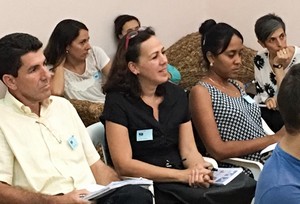
May 21, 2016 | Focolare Worldwide, Senza categoria
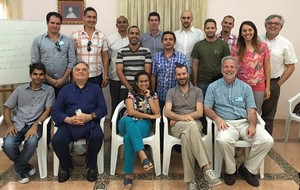 “Although the challenges are many that the Caribbean country has before it, it seemed to me that the Economy of Communion (EoC) was just made for Cuba” said United States EoC business owner John Mundell while speaking at the conclusion of an event on April 29, 2016 in Havana. There were about thirty people including representatives of local cuenta propismo (self employment) training groups, members of discussion teams examining new socio-economic proposals, entrepreneurs, accountants, as well as people with a general interest in the topic. In addition to the aforementioned business owner from Indianapolis and member of the EoC International Commission, there were also representatives from Italy: Gaetano Giunta and Steni di Piazza from the MECC (Microcredito per L’Economia civile e di comunione) , Francesco Tortorella and Francesco Marini of the Projects Sector of Action for a United World (AMU). In his opening address, Apostolic Nuncio, Archbishop Giorgio Lingua recalled the invitation Pope Francis extended to the youth during his visit to the island in September 2015: “Live ‘social friendship’ so that you’ll be able to discern together how to implement it and help others to live for the common good.” “Very appropriate words,” thought Paola Montetta who was one of the organizers of the event, “given that we had Christians and non-believers who had Socialist training, and all of us moved by the desire to live a lifestyle of communion.” After an overview of the Civil Economy, the Economy of Communion (EoC) was presented that included a description of the novelties and challenges it poses, placing the human person at the centre of economic action, particularly the vulnerable and the needy. The experiences of the entrepreneurs from the EoC showed that “despite the pressures, it is possible to pursue a lifestyle of communion in business, respecting the productivity and the environment, while, at the same time, you become generators of reciprocity and communion inside and outside the business.”
“Although the challenges are many that the Caribbean country has before it, it seemed to me that the Economy of Communion (EoC) was just made for Cuba” said United States EoC business owner John Mundell while speaking at the conclusion of an event on April 29, 2016 in Havana. There were about thirty people including representatives of local cuenta propismo (self employment) training groups, members of discussion teams examining new socio-economic proposals, entrepreneurs, accountants, as well as people with a general interest in the topic. In addition to the aforementioned business owner from Indianapolis and member of the EoC International Commission, there were also representatives from Italy: Gaetano Giunta and Steni di Piazza from the MECC (Microcredito per L’Economia civile e di comunione) , Francesco Tortorella and Francesco Marini of the Projects Sector of Action for a United World (AMU). In his opening address, Apostolic Nuncio, Archbishop Giorgio Lingua recalled the invitation Pope Francis extended to the youth during his visit to the island in September 2015: “Live ‘social friendship’ so that you’ll be able to discern together how to implement it and help others to live for the common good.” “Very appropriate words,” thought Paola Montetta who was one of the organizers of the event, “given that we had Christians and non-believers who had Socialist training, and all of us moved by the desire to live a lifestyle of communion.” After an overview of the Civil Economy, the Economy of Communion (EoC) was presented that included a description of the novelties and challenges it poses, placing the human person at the centre of economic action, particularly the vulnerable and the needy. The experiences of the entrepreneurs from the EoC showed that “despite the pressures, it is possible to pursue a lifestyle of communion in business, respecting the productivity and the environment, while, at the same time, you become generators of reciprocity and communion inside and outside the business.”  These are certainly important topics especially in view of promoting possible alternatives to the offensive from capitalism, particularly given the current economic situation in Cuba. The experiences of MECC and AMU in the field of social projects which it promotes around the world, have opened new horizons that make room for important and fruitful dialogue. “The meeting turned out as was hoped: as a multiplier of reciprocity and experiences of communion and as an incubator for ideas and proposals,” said Paolo Monetta. And John Mundell: “During the return trip I was on a plane with a lot of American business people, individually invited for “People To People Travel” – all of them intent on discussing business opportunities that are opening in Cuba. If I’m on a plane filled with American capitalists, I said to myself, then this time the EoC is moving at just the right moment!” The next appointment will be November 2016: “With the goal of involving those who want to create synergies with us in favor of communion and in view of a more just and united world.”
These are certainly important topics especially in view of promoting possible alternatives to the offensive from capitalism, particularly given the current economic situation in Cuba. The experiences of MECC and AMU in the field of social projects which it promotes around the world, have opened new horizons that make room for important and fruitful dialogue. “The meeting turned out as was hoped: as a multiplier of reciprocity and experiences of communion and as an incubator for ideas and proposals,” said Paolo Monetta. And John Mundell: “During the return trip I was on a plane with a lot of American business people, individually invited for “People To People Travel” – all of them intent on discussing business opportunities that are opening in Cuba. If I’m on a plane filled with American capitalists, I said to myself, then this time the EoC is moving at just the right moment!” The next appointment will be November 2016: “With the goal of involving those who want to create synergies with us in favor of communion and in view of a more just and united world.”

May 20, 2016 | Focolare Worldwide
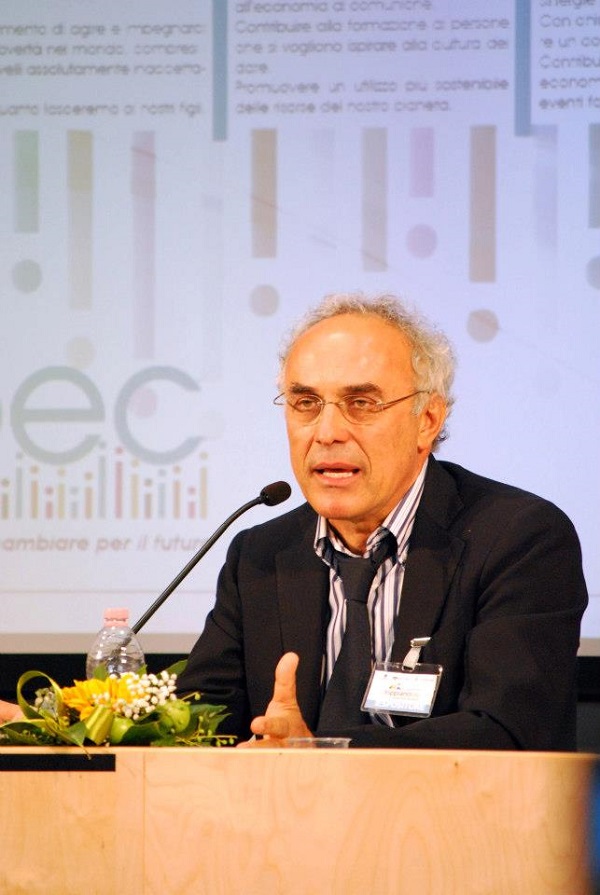 “The inspiration to form the Italian Association of Entrepreneurs for an Economy of Communion (AIPEC), goes back to 2012, during what seemed to be the worst economic crisis in Italy. It was then that a group of businessmen, members of the EoC, felt they had to react. The first step was to see if there were possibilities for their businesses to work with one another. In autumn that year, the memorandum of association was approved, along with the charter and an ethical code. The association immediately proved to be a means for the dissemination of the Economy of Communion.” Upon tracing the association’s origins, Livio Bertola, also illustrated the objectives: “The core values of the association draw inspiration from a “culture of giving.” This is why the shareholders feel the urge not to expect gains for themselves, but to find ways of doing something for the others.” What are the objectives of AIPEC and who does it address? “We are addressing businessmen, freelance professionals, cooperatives and generally, all those who wish to have a people-centred economy: employees, students, housewives, pensioners, unemployed, etc. AIPEC aims to promote the values of the Economy of Communion, and we are trying to do so as best we can: on the one hand, promoting throughout Italy, meetings with people who wish to obtain the utmost from their own work, and organising schools of civil economy with special regard for the young generations; on the other, supporting the activities of associated entrepreneurs, and enhancing the synergies that can be created among them.”
“The inspiration to form the Italian Association of Entrepreneurs for an Economy of Communion (AIPEC), goes back to 2012, during what seemed to be the worst economic crisis in Italy. It was then that a group of businessmen, members of the EoC, felt they had to react. The first step was to see if there were possibilities for their businesses to work with one another. In autumn that year, the memorandum of association was approved, along with the charter and an ethical code. The association immediately proved to be a means for the dissemination of the Economy of Communion.” Upon tracing the association’s origins, Livio Bertola, also illustrated the objectives: “The core values of the association draw inspiration from a “culture of giving.” This is why the shareholders feel the urge not to expect gains for themselves, but to find ways of doing something for the others.” What are the objectives of AIPEC and who does it address? “We are addressing businessmen, freelance professionals, cooperatives and generally, all those who wish to have a people-centred economy: employees, students, housewives, pensioners, unemployed, etc. AIPEC aims to promote the values of the Economy of Communion, and we are trying to do so as best we can: on the one hand, promoting throughout Italy, meetings with people who wish to obtain the utmost from their own work, and organising schools of civil economy with special regard for the young generations; on the other, supporting the activities of associated entrepreneurs, and enhancing the synergies that can be created among them.”  The values of Economy of Communion are expressed in two words that seem to contradict each other … “In effect, the businessmen who join the EoC make a revolutionary choice. The reason why we inserted the preposition “for” is due to the fact that firstly, we are still in the process of building a full communion and none of us has the presumption to feel that we have reached the goal, and secondly, though not less importantly, because Economy of Communion was created for the poor; it is with them that each of the businesses freely shares a part of the corporate profits. This is why we entrepreneurs feel the need to work together by sharing ideas, giving support, paying attention to the others (employees, clients, suppliers, shareholders, or even competitors), and sharing ideas, difficulties and talents. We pay special attention to the businessmen and workers who in these years are suffering the consequences of the economic and social crises.” Who can join your association? “Our network is made up of entrepreneurs and professionals who we define as ordinary partners, and also all the people who want to uphold the values of EoC and who we consider our supporter-partners. You can cooperate with AIPEC also by visiting the site which offers a lot of information on the activities of the association, initiatives and events for information and diffusion. By becoming a supporter, you can become an active part of the projects underway, and also create new projects together.” Any project in the making? “We set an ambitious objective: to spend the next three years from the actual 200 to 6,000 partners! However, personal collaboration and contributions are fundamental, especially of those who already know the EoC and wish to give their time and energy to make the “culture of giving” grow in Italy and throughout the world.”
The values of Economy of Communion are expressed in two words that seem to contradict each other … “In effect, the businessmen who join the EoC make a revolutionary choice. The reason why we inserted the preposition “for” is due to the fact that firstly, we are still in the process of building a full communion and none of us has the presumption to feel that we have reached the goal, and secondly, though not less importantly, because Economy of Communion was created for the poor; it is with them that each of the businesses freely shares a part of the corporate profits. This is why we entrepreneurs feel the need to work together by sharing ideas, giving support, paying attention to the others (employees, clients, suppliers, shareholders, or even competitors), and sharing ideas, difficulties and talents. We pay special attention to the businessmen and workers who in these years are suffering the consequences of the economic and social crises.” Who can join your association? “Our network is made up of entrepreneurs and professionals who we define as ordinary partners, and also all the people who want to uphold the values of EoC and who we consider our supporter-partners. You can cooperate with AIPEC also by visiting the site which offers a lot of information on the activities of the association, initiatives and events for information and diffusion. By becoming a supporter, you can become an active part of the projects underway, and also create new projects together.” Any project in the making? “We set an ambitious objective: to spend the next three years from the actual 200 to 6,000 partners! However, personal collaboration and contributions are fundamental, especially of those who already know the EoC and wish to give their time and energy to make the “culture of giving” grow in Italy and throughout the world.”
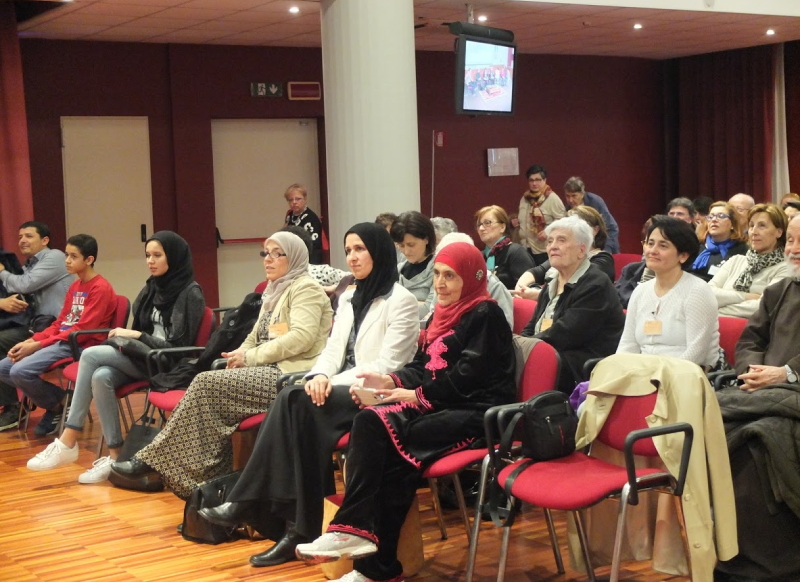
May 19, 2016 | Focolare Worldwide
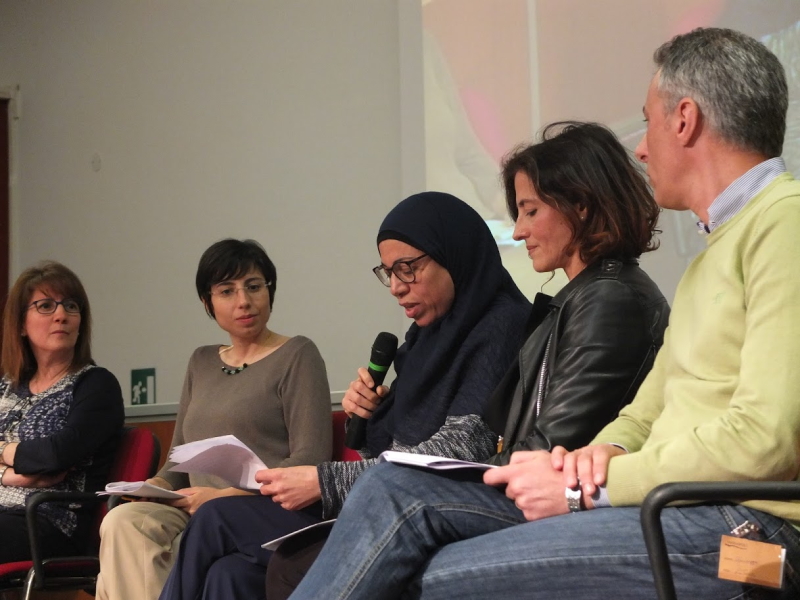
Photo: Rosario De Rosa

Foto: Rosario De Rosa
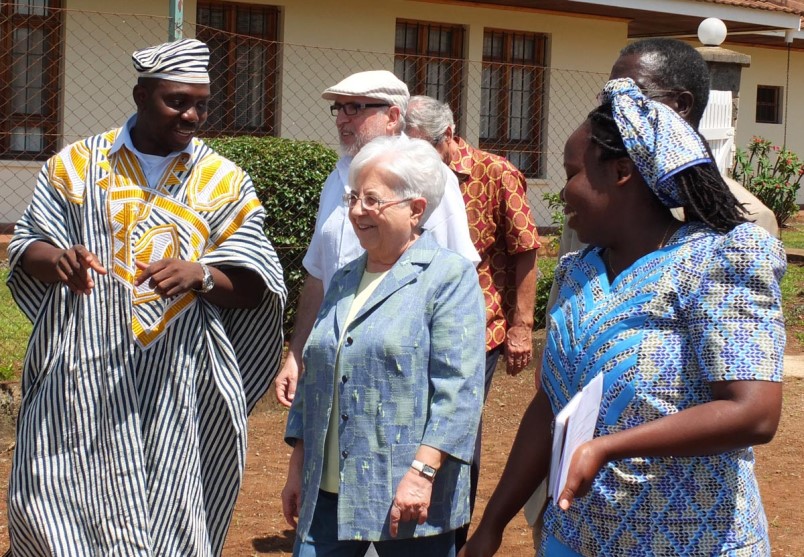
May 18, 2016 | Focolare Worldwide
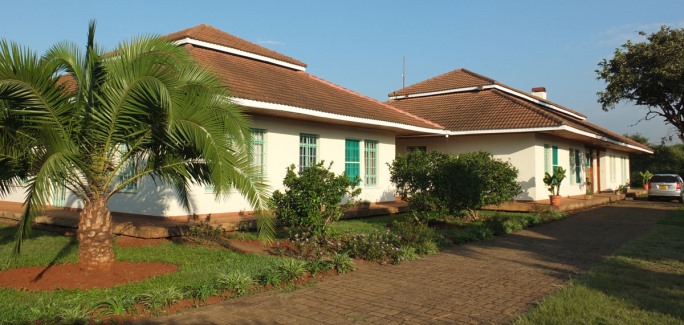
Foto © Ernst Ulz – CSC Audiovisivi

Foto © Ernst Ulz – CSC Audiovisivi
New City Africa
Video in Italian and English:
https://vimeo.com/146788855

 “In our culture,” recounts a Congolese husband after 14 years of marriage, “the first child should be immediately conceived. If after six months a woman still has not conceived, the husband’s family subjects her to stress.” “This is exactly what happened to me – his wife continued. We were already giving half of our salaries to my in-laws who were already in their old age and could no longer work, but this didn’t suffice. They wanted us to have a child who would carry on their lives even after they died. Since nothing happened, my mother-in-law wanted to convince me to go to the quack doctor, and seeing my reluctance, started putting pressure on my husband to ask for a divorce. But he was determined, and though full of respect, told them clearly that he did not give in to their demands because he loved me, and having been married in church, our marriage was “for always.” After three years we decided to adopt two boys, and after 12 years, thanks to a treatment I had in South Africa and our faith in God, we were able to have a daughter, and three months ago, a boy.” “Also my wife,” another Congolese husband continued, “had problems in conceiving. She managed to get pregnant but after a few months would lose the child. Our neighbours said all sorts of things, accusations kindled also by my aunt who did not like my wife. My family had even suggested we make a traditional sacrifice to our ancestors. We explained to them that as Christians, we are not against traditional rites since also in traditions do we find the seeds of the Word, but that we firmly believed in God’s help. One day, a friend of ours, a university professor came to visit, and hearing about our problem, gave us some precious suggestions on how to help the pregnancy progress. Precisely in those days, my wife was five months pregnant, and thanks to his suggestions, her pregnancy continued up to the birth of our child. The same thing happened for the other five children who followed later.” “Upon concluding my studies, “André says, “I found a job in another city, and before leaving, the family got together to give me all the advice they thought I needed. Among these, was that of marrying a girl of my own tribe. I didn’t agree. We had always thought I would marry the one God had planned for me, regardless of where she came from. When I fell in love with Julie, I did not know that she was from a tribe that fought my tribe. I learnt about it later, and it was then that I remembered the instructions of my family. After considerable thought, I understood better what it meant for me to live the Gospel, that is, to succeed in seeing every neighbour not as an enemy, but as a brother, since we are all children of the same Father. So I decided to stick to the principles God had sown in my heart. During our engagement, serious clashes sparked up between our two regions, but Julie and I, despite those difficult times, continued to nurture our relationship until we got married. Our neighbours were certain that our marriage would not last more than six months.” Julie confided: “Even I doubted it would last – but then I saw how faithful André was to me and even if we had different characters, nutritional habits, and mother tongue, we continued to love each other. This year, we celebrated our 23rd wedding anniversary with our four sons. “From the start, each of us had undertaken the commitment to make the other’s family our very own,” André continued, “and with time we managed to get closer to those relatives who initially countered our marriage. In our tradition, giving one’s own name to a child was a demonstration of affection one has for him, a way of immortalizing oneself in him. Julie wanted our sons to have the names of my relatives. With this gesture, also she has been immortalized in my family.”
“In our culture,” recounts a Congolese husband after 14 years of marriage, “the first child should be immediately conceived. If after six months a woman still has not conceived, the husband’s family subjects her to stress.” “This is exactly what happened to me – his wife continued. We were already giving half of our salaries to my in-laws who were already in their old age and could no longer work, but this didn’t suffice. They wanted us to have a child who would carry on their lives even after they died. Since nothing happened, my mother-in-law wanted to convince me to go to the quack doctor, and seeing my reluctance, started putting pressure on my husband to ask for a divorce. But he was determined, and though full of respect, told them clearly that he did not give in to their demands because he loved me, and having been married in church, our marriage was “for always.” After three years we decided to adopt two boys, and after 12 years, thanks to a treatment I had in South Africa and our faith in God, we were able to have a daughter, and three months ago, a boy.” “Also my wife,” another Congolese husband continued, “had problems in conceiving. She managed to get pregnant but after a few months would lose the child. Our neighbours said all sorts of things, accusations kindled also by my aunt who did not like my wife. My family had even suggested we make a traditional sacrifice to our ancestors. We explained to them that as Christians, we are not against traditional rites since also in traditions do we find the seeds of the Word, but that we firmly believed in God’s help. One day, a friend of ours, a university professor came to visit, and hearing about our problem, gave us some precious suggestions on how to help the pregnancy progress. Precisely in those days, my wife was five months pregnant, and thanks to his suggestions, her pregnancy continued up to the birth of our child. The same thing happened for the other five children who followed later.” “Upon concluding my studies, “André says, “I found a job in another city, and before leaving, the family got together to give me all the advice they thought I needed. Among these, was that of marrying a girl of my own tribe. I didn’t agree. We had always thought I would marry the one God had planned for me, regardless of where she came from. When I fell in love with Julie, I did not know that she was from a tribe that fought my tribe. I learnt about it later, and it was then that I remembered the instructions of my family. After considerable thought, I understood better what it meant for me to live the Gospel, that is, to succeed in seeing every neighbour not as an enemy, but as a brother, since we are all children of the same Father. So I decided to stick to the principles God had sown in my heart. During our engagement, serious clashes sparked up between our two regions, but Julie and I, despite those difficult times, continued to nurture our relationship until we got married. Our neighbours were certain that our marriage would not last more than six months.” Julie confided: “Even I doubted it would last – but then I saw how faithful André was to me and even if we had different characters, nutritional habits, and mother tongue, we continued to love each other. This year, we celebrated our 23rd wedding anniversary with our four sons. “From the start, each of us had undertaken the commitment to make the other’s family our very own,” André continued, “and with time we managed to get closer to those relatives who initially countered our marriage. In our tradition, giving one’s own name to a child was a demonstration of affection one has for him, a way of immortalizing oneself in him. Julie wanted our sons to have the names of my relatives. With this gesture, also she has been immortalized in my family.”




 “The inspiration to form the
“The inspiration to form the  The values of Economy of Communion are expressed in two words that seem to contradict each other … “In effect, the businessmen who join the EoC make a revolutionary choice. The reason why we inserted the preposition “for” is due to the fact that firstly, we are still in the process of building a full communion and none of us has the presumption to feel that we have reached the goal, and secondly, though not less importantly, because Economy of Communion was created for the poor; it is with them that each of the businesses freely shares a part of the corporate profits. This is why we entrepreneurs feel the need to work together by sharing ideas, giving support, paying attention to the others (employees, clients, suppliers, shareholders, or even competitors), and sharing ideas, difficulties and talents. We pay special attention to the businessmen and workers who in these years are suffering the consequences of the economic and social crises.” Who can join your association? “Our network is made up of entrepreneurs and professionals who we define as ordinary partners, and also all the people who want to uphold the values of EoC and who we consider our supporter-partners. You can cooperate with AIPEC also by visiting the
The values of Economy of Communion are expressed in two words that seem to contradict each other … “In effect, the businessmen who join the EoC make a revolutionary choice. The reason why we inserted the preposition “for” is due to the fact that firstly, we are still in the process of building a full communion and none of us has the presumption to feel that we have reached the goal, and secondly, though not less importantly, because Economy of Communion was created for the poor; it is with them that each of the businesses freely shares a part of the corporate profits. This is why we entrepreneurs feel the need to work together by sharing ideas, giving support, paying attention to the others (employees, clients, suppliers, shareholders, or even competitors), and sharing ideas, difficulties and talents. We pay special attention to the businessmen and workers who in these years are suffering the consequences of the economic and social crises.” Who can join your association? “Our network is made up of entrepreneurs and professionals who we define as ordinary partners, and also all the people who want to uphold the values of EoC and who we consider our supporter-partners. You can cooperate with AIPEC also by visiting the 


